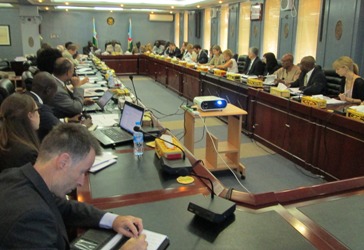“We have changed,” say national reconciliation trainees in Juba
April 18, 2013 (JUBA) – It was two weeks ago when a four-week training of 200 peace mobilisers from youth members across the 10 states of South Sudan began in the national capital, Juba.

Ajing Chol Giir, a young man from Warrap state could not hesitate to express his feeling about the training, which he had been actively participating in for the last two weeks.
“It has changed me from the way I was thinking about other tribes,” he told journalists, on Thursday in Juba, while attending the training session.
Ajing, who will continue in the training for the next two weeks in Juba, said the training on national reconciliation process had given him the sense of brotherhood and nationhood, adding that he would now leave Juba a new person; ready to change the mindset of his colleagues in his home state.
South Sudan’s government had initiated the reconciliation process for the last few months in order to reconcile the divided communities by decades of war, fearing that the lingering inter-communal violent conflicts would continue to hamper development and harmony in the country, unless its root causes were also addressed.
Schools and health centres have also been targets for destruction by rival communities in the region, who also lay road blocks to disrupt trade and movement of people between communities or towns and villages.
President Salva Kiir, according to sources, a few months ago directed his deputy, Riek Machar, to spearhead the initiation of the national reconciliation process in an official letter delivered from the president to the latter, giving him the green light.
An organising committee, under the chairmanship of the presidential advisor on decentralisation and intergovernmental linkages, Tor Deng Mawien, was tasked to organise consultative meetings with stakeholders and conduct trainings and workshops in preparation for a country-wide conference, which would adopt a strategy to achieve the undertaking.
A proposed national council was to be formed under the office of the president, with peace and reconciliation commission to serve as the council’s secretariat.
For the last two months, consultative meetings with donors, international and local non-governmental organisations, civil society organisations, faith-based groups and political parties, among others, had been organised under the guidance of the top leadership in the person of the vice-president.
The consultative conference, which was initially planned for 18th April was postponed to 1st June this year to give time for the preparations.
However, President Kiir on Monday issued a presidential order suspending the holding of the proposed national reconciliation conference, until a time he would form a committee that would prepare for the said event.
Kiir also issued a controversial order on Monday for withdrawal of unspecified delegated powers from his deputy.
Sources told Sudan Tribune that the president made the prompt decision because the two leaders couldn’t agree on the timing and agenda for the reconciliation.
The president, the source said, wanted the process delayed and also restricted to reconciling communities that experienced violent conflicts, while Machar wanted the process to kick off this year and also address issues of tribalism, good governance, justice, development, distribution of resources, land grabbing, among others, which he argued were some of the factors that caused disharmony in the country.
The matter is believed to have been worsened by Machar’s recent declaration to challenge the South Sudan leader in the ruling party’s contest for the SPLM’s chairmanship in the upcoming convention, earning him the suspicion that he wanted to use the reconciliation process as a campaign to gain more popularity among the South Sudanese public.
Officials of the national reconciliation, however, told Sudan Tribune that Kiir had verbally amended his order, allowing the training for the 200 peace mobilisers to continue until they finish the training.
Lochebe Boniface Losike, a trainee from Eastern Equatoria state, on Thursday also stressed the importance of the training, saying it made it possible for them to identify the root causes of the conflicts in the region.
“This is a collective responsibility. We are equipped with the knowledge on how to change the mindset of the people,” he confidently said.
(ST)
